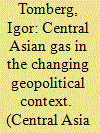| Srl | Item |
| 1 |
ID:
127572


|
|
|
|
|
| Publication |
2012.
|
| Summary/Abstract |
The 21st century has confronted mankind with hitherto unknown dangers: the planet's natural resources, particularly energy supplies, have been depleting at a fast pace, which has stirred up fierce and mounting rivalry over hydrocarbons and other raw materials. In 2011, the growing instability in North Africa and the Middle East added fuel to the smoldering fire, increased the volatility of the energy markets, and cast doubts on continued and consistent fuel supplies from these and adjacent regions. Central Asia, in turn, is potentially threatened by the unwelcome developments around Afghanistan and Iran; ambitious investment projects (particularly in the energy sphere) are being jeopardized since investors are justifiably worried that a conflict with Iran might spread, in one form or another, to its Caspian neighbors.
|
|
|
|
|
|
|
|
|
|
|
|
|
|
|
|
| 2 |
ID:
159476


|
|
|
|
|
| Summary/Abstract |
Since oil began fueling the global economy, governments have employed policies of “energy mercantilism” to secure access to this key input. Critics of these policies claim they are unnecessary because oil can be acquired on global markets. Countries such as China that engage in energy mercantilism are thus neither enhancing their energy security nor threatening others' access to oil. These critics, however, misunderstand the logic of energy mercantilism, which is rooted in the economics and business literatures on supply chain management. Firms and states are correct to worry about access to critical supplies under four conditions: imperfect contracting, supplier collusion, geographic concentration, and high risk of conflict. All of these conditions plague the oil industry. Likewise, the energy mercantilist policies that critics deride are analogous to the strategies that firms adopt to protect their supply chains. China's steps to ensure access to oil have enhanced its energy security and reduced U.S. coercive options toward Beijing. More broadly, the unfolding competition over energy access highlights the lingering power of mercantilism, even in this age of economic globalization and the apparent triumph of market liberalism.
|
|
|
|
|
|
|
|
|
|
|
|
|
|
|
|
| 3 |
ID:
133872


|
|
|
|
|
| Publication |
2014.
|
| Summary/Abstract |
The author, who retired from the RN in 2006 and who went to work in the ports industry and who is now a non-executive director of Milford Haven port, briefly outlines the changes that are occurring in the transport of energy supplies and the possible implications for the Royal Navy.
|
|
|
|
|
|
|
|
|
|
|
|
|
|
|
|